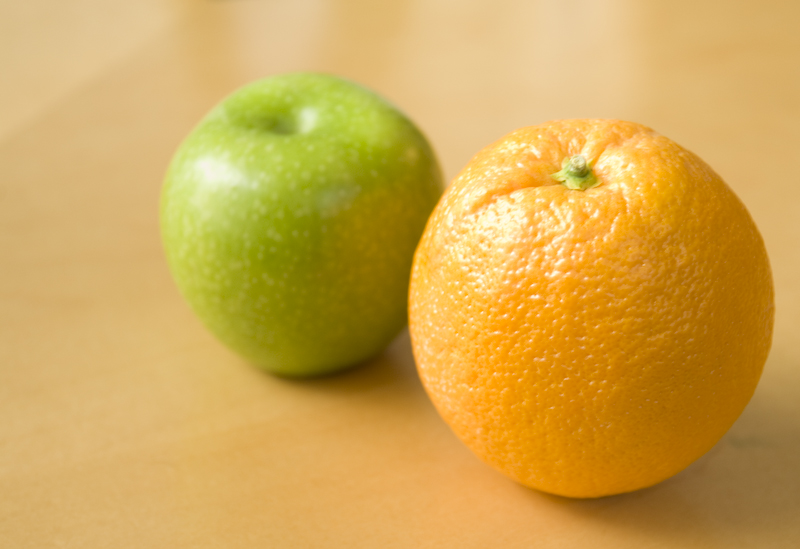False Equivalence on:
[Wikipedia]
[Google]
[Amazon]
 A false equivalence or false equivalency is an
A false equivalence or false equivalency is an
 A false equivalence or false equivalency is an
A false equivalence or false equivalency is an informal fallacy
Informal fallacies are a type of incorrect argument in natural language. The source of the error is not just due to the ''form'' of the argument, as is the case for formal fallacies, but can also be due to their ''content'' and ''context''. Fallac ...
in which an equivalence is drawn between two subjects based on flawed, faulty, or false reasoning. This fallacy is categorized as a fallacy of inconsistency. Colloquially, a false equivalence is often called "comparing apples and oranges."
Characteristics
This fallacy is committed when one shared trait between two subjects is assumed to show equivalence, especially in order of magnitude, when equivalence is not necessarily the logical result. False equivalence is a common result when an anecdotal similarity is pointed out as equal, but the claim of equivalence does not bear scrutiny because the similarity is based on oversimplification or ignorance of additional factors. The pattern of the fallacy is often as such: In an even more fallacious version, is not required to exist in both sets; merely a similarity of two items in set and in set is cited to assert equivalence among the sets. Example:Examples
The following statements are examples of false equivalence: ; "The ''Deepwater Horizon'' oil spill is no more harmful than when your neighbor drips some oil on the ground when changing his car's oil." :The "false equivalence" is the comparison between things differing by many orders of magnitude: ''Deepwater Horizon'' spilled of oil; one's neighbor might spill perhaps . ; "They are bothFelidae
Felidae ( ) is the Family (biology), family of mammals in the Order (biology), order Carnivora colloquially referred to as cats. A member of this family is also called a felid ( ).
The 41 extant taxon, extant Felidae species exhibit the gre ...
, mammal
A mammal () is a vertebrate animal of the Class (biology), class Mammalia (). Mammals are characterised by the presence of milk-producing mammary glands for feeding their young, a broad neocortex region of the brain, fur or hair, and three ...
s in the order Carnivora
Carnivora ( ) is an order of placental mammals specialized primarily in eating flesh, whose members are formally referred to as carnivorans. The order Carnivora is the sixth largest order of mammals, comprising at least 279 species. Carnivor ...
, therefore there's little difference between having a pet cat and a pet jaguar
The jaguar (''Panthera onca'') is a large felidae, cat species and the only extant taxon, living member of the genus ''Panthera'' that is native to the Americas. With a body length of up to and a weight of up to , it is the biggest cat spe ...
."
:The "false equivalence" is in an oversimplification of the factors that make an animal a suitable pet.
; "Consuming marijuana
Cannabis (), commonly known as marijuana (), weed, pot, and ganja, List of slang names for cannabis, among other names, is a non-chemically uniform psychoactive drug from the ''Cannabis'' plant. Native to Central or South Asia, cannabis has ...
can lead to consuming and acquiring a psychological dependence on heroin
Heroin, also known as diacetylmorphine and diamorphine among other names, is a morphinan opioid substance synthesized from the Opium, dried latex of the Papaver somniferum, opium poppy; it is mainly used as a recreational drug for its eupho ...
later in life by acting as a gateway drug, so taking marijuana is like taking heroin."
:The "false equivalence" is not considering the difference in likelihood. Consuming heroin is more likely to lead to future heroin dependence than taking marijuana, even given the assumption that one who begins using marijuana is more likely at some later time to try heroin, than someone who has never used marijuana.
Negative consequence
False equivalence arguments are often used in journalism and in politics, where flaws of one politician may be compared to flaws of a wholly different nature of another. Thomas Patterson of the Shorenstein Center on Media, Politics and Public Policy atHarvard University
Harvard University is a Private university, private Ivy League research university in Cambridge, Massachusetts, United States. Founded in 1636 and named for its first benefactor, the History of the Puritans in North America, Puritan clergyma ...
wrote about the false equivalency used by the media during the 2016 United States presidential election
United States presidential election, Presidential elections were held in the United States on November 8, 2016. The Republican Party (United States), Republican ticket of businessman Donald Trump and Indiana Governor, Indiana governor Mike P ...
:
See also
* '' Ad Hominem'' *Affirming the consequent
In propositional logic, affirming the consequent (also known as converse error, fallacy of the converse, or confusion of necessity and sufficiency) is a formal fallacy (or an invalid form of argument) that is committed when, in the context of a ...
* Apophenia
* Equivocation
In logic, equivocation ("calling two different things by the same name") is an informal fallacy resulting from the use of a particular word or expression in multiple senses within an argument.
It is a type of ambiguity that stems from a phrase ...
* False balance
* False analogy
* List of fallacies
* ''Tu quoque
is a discussion technique that intends to discredit the opponent's argument by attacking the opponent's own personal behavior and actions as being inconsistent with their argument, so that the opponent appears hypocritical. This specious reaso ...
''
* Whataboutism
* Wronger than wrong
References
Further reading
*External links
* * {{Fallacies Informal fallacies Fallacies